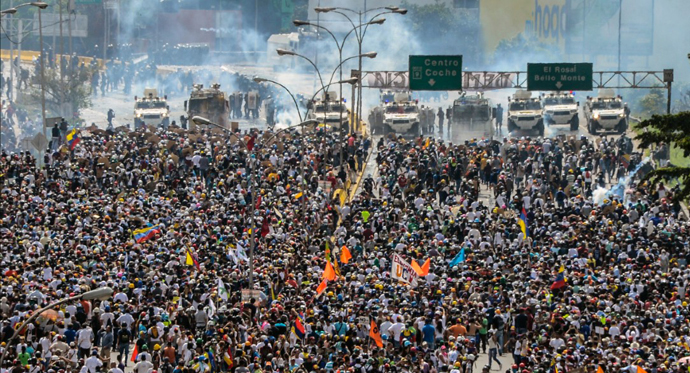The US Must Support a New Free Venezuela
By Walid Phares (February 2019)

Protests against Maduro, courtesy of CNN
With the mass demonstrations in Caracas and other Venezuelan cities spreading and persisting against the Maduro regime, Washington and other Western capitals are quickly shifting gears to support a change of government in the embattled country. This is a crucial moment as a major anti-American, pro-Iran, Marxist regime in the Western Hemisphere is facing an existential crisis from within. What should the United States and its allies do now?
The fact that there are now two leaders both claiming to be the legitimate President of Venezuela is a direct consequence of years of oppression, first by the Chavez regime and then continued by Maduro. The far-left radical group that seized power and allied itself with authoritarian regimes in Latin America and beyond failed to meet the basic economic needs of Venezuelans, despite the fact that the country has one of the largest reserves of oil and energy in the world. Shortages of food and supplies led to demonstrations under Chavez—and when hyperinflation and economic collapse intensified under Maduro, so did the demonstrations.
Maduro then waged a massive suppression campaign against the protesters, leading to bloodshed, mass arrests, torture and disappearances, all documented by international organizations. Political violence, and social and economic collapse then led to a severe refugee crisis, with more than three million Venezuelans crossing into Colombia and Brazil and spreading across South America. Another extension of the crisis could lead to the exodus of more than five million citizens. On these grounds alone, the United Nations and the outside world have the obligation to intervene. But Maduro is not without friends.
Read More in New English Review:
Apeshit at the Louvre
Some Devilry
There Really is a Crisis at the Border
Over the past few years, the Chavista/Maduro regime built strong bridges to the far-left governments of Latin America, establishing relationships with Cuba, Nicaragua, Bolivia, Ecuador and, at some point, the Lula establishment in Brazil. The Marxist network backed the “Caracas Stalinists” and blocked international efforts to save democracy in Venezuela.
Moreover, for more than a decade, another radical regime established roots in the country—the Iranian regime and its ally Hezbollah. Maduro’s bureaucracy recruited elements allied to Tehran, and Hezbollah established its headquarters in the country for operations across South America and the Hemisphere. It has been reported that Maduro’s Middle Eastern guests took part in the repression against Venezuelan citizens.
The current wave of confrontation between the opposition and the regime is different. The elected speaker of the National Assembly, liberal politician Juan Guaido, was able to find a process to impeach Maduro after Maduro’s reelection in the highly corrupted voting process last May. The Parliament removed Maduro and installed Guaido as interim President, but the armed forces and militias of the regime are still backing the communist dictator despite the widespread demonstrations across the country.
As the number of citizens killed and wounded by the regime rose, Washington moved against Maduro. The Trump administration, followed by the Organization of American States (OAS)—the equivalent of the EU for the Hemisphere—and recognized the interim President, then by Canada and a growing number of governments worldwide. The administration’s move against Maduro is led by Secretary of State Pompeo and National Security Advisor John Bolton, both seasoned strategists on countering radical regimes. The swift US decision left little choice to the other international parties: they were either with an oppressive regime or with the people of Venezuela. Following suit, France, the UK, and the EU announced they will give eight days to Maduro to accept a new free election, monitored by the UN—otherwise they will deal with Guaido as President.
The battle raged at the UN Security Council where Russia, Iran, Cuba, and Nicaragua blasted the US for “meddling in Venezuela’s internal affairs,” while the UK and a large alliance of Latin American, European, and Arab countries led by the US continued to isolate Maduro and his radical allies. What can and should the Trump administration do from here on out?
I recommend the following to Washington and the Trump administration:
- Make the case that the battle in Venezuela is between the people and this oppressive, illegitimate regime, with immense ramifications for the health, security, and freedom of millions of Venezuelans.
- Make the case that those forces meddling in Venezuela are Iran, Hezbollah, Cuba, and Russia.
- Expose the governments who are siding with Maduro while pocketing US aid.
- Ensure that the vast coalition led by the US includes all possible countries from around the world, including Latin America, Africa, and Asia.
- Provide direct support to interim President Guaido and his government, on all levels.
- Ask the Maduro regime to evacuate the Venezuelan embassy in Washington and ask the Guaido government to take over.
- Channel humanitarian aid to the Venezuelan refugees on Colombian and Brazilian borders under the supervision of the OAS and the UN.
- Call on the Venezuelan armed forces to cease its operations against demonstrators and side with President Guaido, and sever all ties to Iran and Hezbollah assets in the country.
- Bring prosecution against the Maduro regime for crimes against humanity in the International Criminal Court.
- Stand ready to respond to a call from the legitimate President of Venezuela to intervene if Maduro forces engage in mass bloodshed or a coup against the Parliament and the interim President.
If the Trump administration holds firm on these ten points, the Maduro regime will fall and a democratically elected new government in Venezuela will emerge, bringing peace and security to the country and the region.
__________________________________
Dr. Walid Phares is a former foreign policy adviser to Donald Trump and the Co-Secretary General of the Transatlantic Parliamentary Group on Counter Terrorism (TAG). He is the author of The War of Ideas.
Follow NER on Twitter @NERIconoclast